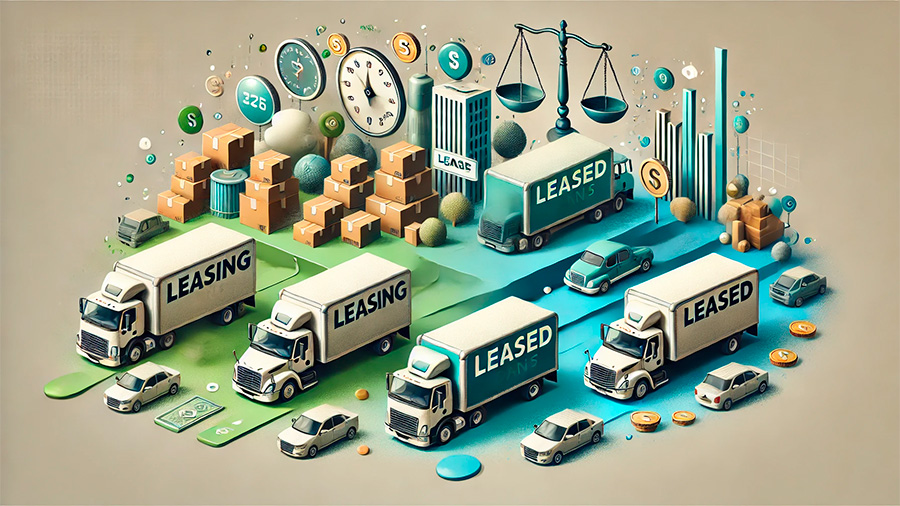The moving and relocation industry is highly competitive, with large companies often dominating the market. However, small moving businesses can still thrive and carve out a niche by leveraging financial tools such as loans and leasing programs. These financing options provide small transport companies with the resources they need to expand their fleets, improve efficiency, and offer competitive services without the need for large upfront investments.
Loans and leasing programs are especially important for smaller businesses that may not have the capital to purchase vehicles or invest in new technology outright. By offering flexible financing options, these programs help small moving companies stay competitive, meet rising customer demand, and grow sustainably. Let’s explore how loans and leasing programs can empower small businesses in the relocation sector and ensure they remain viable in an increasingly crowded marketplace.
Access to Capital for Fleet Expansion
For any moving business, a reliable fleet is the backbone of operations. However, purchasing trucks, vans, and other moving vehicles can be a significant financial burden, especially for small businesses. Leasing programs and business loans offer a solution by providing access to the capital necessary to expand fleets without the hefty upfront costs associated with buying vehicles.
By spreading the cost of acquiring new vehicles over time, small moving companies can scale their operations more quickly and meet the growing demand for relocation services. Whether a business needs to replace aging vehicles or add new ones to handle more clients, leasing and loans offer the flexibility to expand without draining cash reserves.
Leasing for Lower Upfront Costs
Leasing programs are particularly advantageous for small moving companies because they require lower initial payments compared to purchasing vehicles outright. Instead of paying the full purchase price of a vehicle upfront, businesses can lease vehicles and make affordable monthly payments over the lease term. This allows companies to acquire modern, fuel-efficient vehicles without tying up significant capital.
Leasing also provides the option to upgrade vehicles more frequently, ensuring that small businesses always have access to the latest technology and equipment. With modern trucks and vans, small movers can offer reliable, efficient services, which helps build customer trust and enhances their ability to compete with larger companies.
Loans for Long-Term Investment
While leasing offers flexibility, some small moving businesses may prefer to own their vehicles outright. In these cases, business loans can provide the financing needed to purchase vehicles and other equipment. Business loans offer the advantage of ownership, which can be important for companies that plan to use the vehicles for many years and want to build equity.
Securing a business loan allows small companies to make long-term investments in their fleet while maintaining the ability to spread the cost of the purchase over several years. This helps businesses manage their cash flow more effectively and avoid the financial strain of large, upfront purchases.

Improving Efficiency and Service Quality
In the moving industry, efficiency and reliability are key to winning and retaining customers. Small moving companies often face the challenge of competing with larger businesses that have more resources to invest in technology and service improvements. However, leasing loans and financing programs can level the playing field by enabling small companies to invest in the tools they need to improve their operations.
Whether it’s upgrading to more fuel-efficient vehicles, implementing tracking technology, or streamlining administrative processes, loans and leasing programs provide the financial flexibility to make these improvements. By enhancing efficiency and service quality, small movers can attract more customers and compete effectively in the marketplace.
Upgrading to Fuel-Efficient Vehicles
Fuel is one of the largest operational expenses for moving companies, and older vehicles tend to be less fuel-efficient, driving up costs. Leasing modern, fuel-efficient vehicles allows small businesses to reduce their fuel expenses and improve their bottom line. Additionally, fuel-efficient vehicles are better for the environment, which can be a selling point for eco-conscious customers.
By upgrading their fleet with more efficient vehicles, small moving companies can reduce operating costs and pass those savings on to customers, offering more competitive pricing without sacrificing profitability.
Investing in Technology
Technology plays a critical role in improving operational efficiency and customer satisfaction. Many larger moving companies use GPS tracking, automated scheduling, and customer relationship management (CRM) software to optimize their services. Small businesses can also access these tools through loans or leasing programs, allowing them to implement advanced technology without the need for a large initial investment.
For example, GPS tracking allows companies to provide real-time updates to customers, improving transparency and trust. Automated scheduling and CRM software can streamline operations, reducing administrative costs and freeing up time for small business owners to focus on growing their business. These technological upgrades enable smaller companies to deliver a higher level of service, which helps them stand out in a crowded market.
Flexible Financing for Business Growth
As small moving businesses grow, they often face the challenge of managing cash flow while investing in the resources needed to expand. Leasing loans offer a flexible financing solution that allows businesses to grow at their own pace without overextending their finances. This is especially important for companies experiencing seasonal fluctuations in demand or working with limited budgets.
Scaling Operations Gradually
Leasing programs allow small moving companies to scale their operations gradually, adding vehicles or equipment as needed to meet demand. This flexibility is crucial for businesses that experience seasonal peaks, such as during the summer moving season. Rather than committing to large capital expenditures, companies can lease additional vehicles during peak periods and return them when demand slows.
This scalable approach ensures that small movers can adjust their fleet size based on current business needs, maintaining cost efficiency and avoiding the financial risks associated with purchasing vehicles that may not be fully utilized year-round.
Improving Cash Flow Management
Cash flow is a critical concern for small businesses, especially in the moving industry where expenses can fluctuate significantly depending on the season or the size of the move. By financing equipment and vehicle purchases through leasing or loans, small moving companies can preserve cash flow and allocate funds to other important areas, such as marketing, hiring, or expanding services.
Fixed monthly payments also make it easier for businesses to manage their budget and plan for future growth. Instead of facing unpredictable expenses for vehicle repairs or equipment upgrades, companies can rely on predictable payment schedules that allow for better financial planning.

Minimizing Financial Risk
Another significant benefit of leasing loans for small moving companies is the ability to minimize financial risk. Purchasing vehicles outright comes with risks related to depreciation, maintenance costs, and resale value. Leasing allows businesses to avoid many of these risks, as they do not own the vehicles and are not responsible for their depreciation over time.
At the end of the lease term, companies can return the vehicles and lease newer models, ensuring that their fleet remains up to date without the hassle of selling or trading in old vehicles. This minimizes the financial risk associated with vehicle ownership and allows small businesses to focus on growth.
Avoiding Depreciation Costs
Vehicle depreciation can be a significant cost for moving companies, particularly for small businesses with limited budgets. Leasing programs offer a way to avoid the financial losses that come from depreciation. Since the leasing company retains ownership of the vehicle, small businesses are not responsible for the declining value of the asset, making it easier to manage long-term financial commitments.
Flexible Lease Terms
Leasing programs often come with flexible terms that allow businesses to adjust the length of the lease based on their needs. Whether a company requires a short-term lease for a specific project or a longer-term lease for ongoing operations, leasing provides the flexibility to match the company’s financial goals. This adaptability helps small moving companies minimize risk while maintaining the resources needed to grow their business.
Conclusion: Empowering Small Moving Businesses with Leasing Loans
Leasing loans and financing programs are essential tools for small moving businesses looking to compete in the relocation industry. By providing access to the capital needed for fleet expansion, technology upgrades, and operational improvements, these financial solutions enable smaller companies to offer competitive services and grow sustainably. With flexible payment options, lower upfront costs, and reduced financial risk, leasing loans empower small moving businesses to scale their operations, improve efficiency, and stay ahead in a competitive marketplace.
As the relocation industry continues to grow, small businesses that take advantage of these financial tools will be better positioned to meet rising demand, attract more customers, and thrive in a dynamic and fast-paced market.

